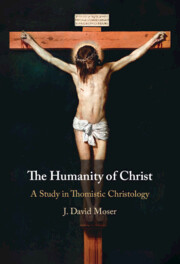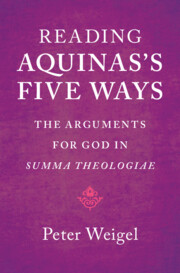Refine search
Actions for selected content:
169 results
Is divine simplicity biblical? A fresh argument on behalf of a traditional doctrine
-
- Journal:
- Scottish Journal of Theology , First View
- Published online by Cambridge University Press:
- 17 December 2025, pp. 1-14
-
- Article
-
- You have access
- Open access
- HTML
- Export citation
Thomas Aquinas, Artificial Intelligence, and AI-Generated Music
-
- Journal:
- New Blackfriars ,
- Published online by Cambridge University Press:
- 05 December 2025, pp. 1-17
-
- Article
- Export citation
Chapter 1 - ‘Enter into the joy of your lord’
-
- Book:
- The Joy of Love in the Middle Ages
- Published online:
- 20 November 2025
- Print publication:
- 04 December 2025, pp 15-33
-
- Chapter
- Export citation
Let Us Consider Our Considerate and Inconsiderate Lives
-
- Journal:
- Horizons , First View
- Published online by Cambridge University Press:
- 19 November 2025, pp. 1-33
-
- Article
- Export citation
‘God could have not created’: critiquing (a) divine counterfactual predication
-
- Journal:
- Scottish Journal of Theology , First View
- Published online by Cambridge University Press:
- 13 November 2025, pp. 1-14
-
- Article
-
- You have access
- Open access
- HTML
- Export citation

Thomism and the Natural Sciences
-
- Published online:
- 17 September 2025
- Print publication:
- 09 October 2025
-
- Element
- Export citation
5 - Dubia, Part 2
- from Part II - Difficulties and Resolutions
-
- Book:
- The Humanity of Christ as Instrument of Salvation
- Published online:
- 21 August 2025
- Print publication:
- 04 September 2025, pp 151-172
-
- Chapter
- Export citation

The Humanity of Christ as Instrument of Salvation
- A Study in Thomistic Christology
-
- Published online:
- 21 August 2025
- Print publication:
- 04 September 2025
Mitzvah mistranslated: Reimagining Aquinas’ threefold division of ‘Old Law’
-
- Journal:
- Scottish Journal of Theology / Volume 78 / Issue 4 / November 2025
- Published online by Cambridge University Press:
- 18 August 2025, pp. 300-315
- Print publication:
- November 2025
-
- Article
- Export citation
Chapter 1 - Maker’s Knowledge Traditions between Ancients and Moderns
-
- Book:
- Vico and the Maker's Knowledge Tradition
- Published online:
- 27 June 2025
- Print publication:
- 17 July 2025, pp 25-59
-
- Chapter
- Export citation
Introduction
-
- Book:
- Reading Aquinas's Five Ways
- Published online:
- 05 June 2025
- Print publication:
- 19 June 2025, pp 1-4
-
- Chapter
-
- You have access
- HTML
- Export citation

Reading Aquinas's Five Ways
- The Arguments for God in Summa Theologiae
-
- Published online:
- 05 June 2025
- Print publication:
- 19 June 2025
3. - Thomas Aquinas (d. 1274), Commentary on the Sentences, book I, d. 3, q. 4, a. 2:
-
- Book:
- Medieval Philosophical Writings on the Powers of the Soul
- Published online:
- 10 April 2025
- Print publication:
- 17 April 2025, pp 67-71
-
- Chapter
- Export citation
6. - Thomas of Sutton (d. ca. 1315), Ordinary Question 4 (excerpts):
-
- Book:
- Medieval Philosophical Writings on the Powers of the Soul
- Published online:
- 10 April 2025
- Print publication:
- 17 April 2025, pp 104-121
-
- Chapter
- Export citation
5. - Godfrey of Fontaines (d. ca. 1306), Quodlibet II, q. 4:
-
- Book:
- Medieval Philosophical Writings on the Powers of the Soul
- Published online:
- 10 April 2025
- Print publication:
- 17 April 2025, pp 96-103
-
- Chapter
- Export citation
9 - Popes and Sexuality within and outside Marriage
- from Part II - Women, Gender, Sexuality
-
-
- Book:
- The Cambridge History of the Papacy
- Published online:
- 28 February 2025
- Print publication:
- 20 March 2025, pp 275-301
-
- Chapter
- Export citation
Thomist Anthropology and the Problem of Causal Interface
-
- Journal:
- New Blackfriars / Volume 106 / Issue 2 / March 2025
- Published online by Cambridge University Press:
- 12 February 2025, pp. 130-142
- Print publication:
- March 2025
-
- Article
-
- You have access
- Open access
- HTML
- Export citation
4 - Second-Personal Worship
- from Part II - What Is Worship?
-
-
- Book:
- The Philosophy of Worship
- Published online:
- 09 January 2025
- Print publication:
- 23 January 2025, pp 51-69
-
- Chapter
- Export citation
Chapter 15 - Scholastic Theology
- from Part III - Religious, Theological, and Philosophical Contexts
-
-
- Book:
- Gerard Manley Hopkins in Context
- Published online:
- 16 January 2025
- Print publication:
- 16 January 2025, pp 129-137
-
- Chapter
- Export citation
Knowing One’s Nature as Self-Knowledge
-
- Journal:
- New Blackfriars / Volume 106 / Issue 1 / January 2025
- Published online by Cambridge University Press:
- 16 January 2025, pp. 13-26
- Print publication:
- January 2025
-
- Article
- Export citation
